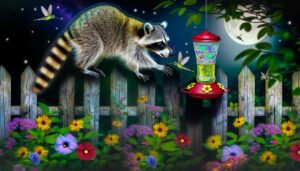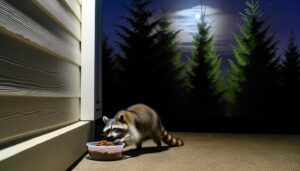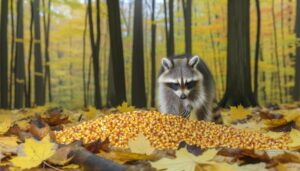Can Raccoons Eat Chocolate Cake?
Raccoons should not consume chocolate cake because it contains theobromine and caffeine, which are toxic to them. Ingestion can lead to severe health issues such as vomiting, diarrhea, seizures, and even death.
Additionally, the high sugar and fat content of cake contributes to obesity and diabetes in raccoons. The lack of essential nutrients in chocolate cake can cause long-term deficiencies affecting overall health.
Behavioral changes, such as hyperactivity and aggression, may also result from sugar and caffeine intake. Providing raccoons with natural, balanced food alternatives is essential for their well-being.
Understanding these dietary risks ensures responsible wildlife care and conservation.
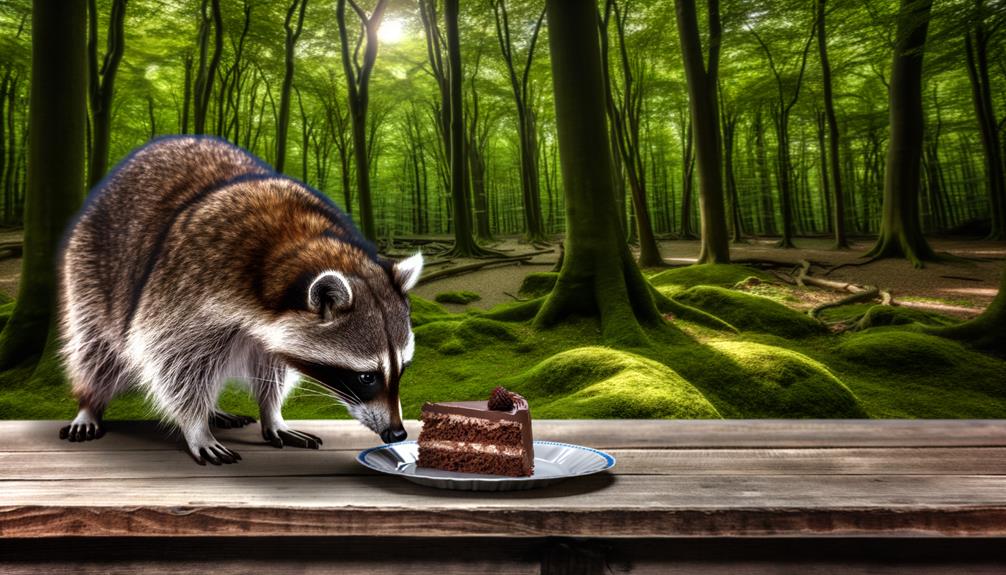
Key Takeaways
- Chocolate cake is harmful to raccoons due to the toxic theobromine and caffeine in chocolate.
- Consumption of chocolate cake can cause vomiting, diarrhea, seizures, and even death in raccoons.
- High sugar and fat content in chocolate cake increases risks of obesity and diabetes in raccoons.
- Chocolate cake lacks essential nutrients, leading to deficiencies in vitamin A, calcium, protein, and fibers.
- Safe alternatives for raccoons include fruits, vegetables, nuts, and eggs to support their well-being.
Raccoon Dietary Overview
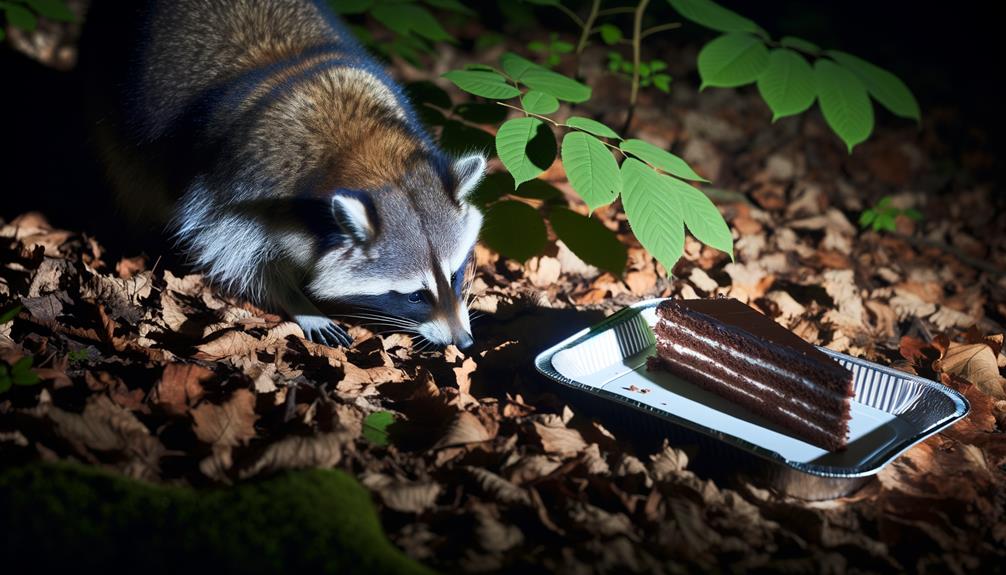
Raccoons (Procyon lotor) are omnivorous mammals with a highly adaptable diet that varies based on their habitat and seasonal availability of food sources. They are known for their opportunistic feeding behaviors, which allow them to exploit a wide range of food items. This dietary flexibility contributes significantly to their survival and adaptability in diverse environments, from urban areas to forests.
Their digestive systems are capable of processing both plant and animal matter, enabling them to consume fruits, nuts, insects, small vertebrates, and even human refuse. The raccoon's ability to adjust its diet according to resource availability is a key aspect of its ecological success.
Understanding this dietary adaptability is essential for comprehending the species' interactions within various ecosystems.
Natural Food Sources
In their natural habitats, these omnivorous mammals primarily rely on a diverse array of food sources such as fruits, nuts, insects, and small vertebrates. This dietary variety guarantees that raccoons can adapt to different ecosystems and seasonal changes.
Specifically, their diet can be categorized into four main components:
- Fruits: Berries, apples, and grapes provide essential vitamins and hydration.
- Nuts: Acorns and walnuts offer necessary fats and proteins.
- Insects: Beetles, grasshoppers, and caterpillars supply critical protein and other nutrients.
- Small Vertebrates: Frogs, fish, and rodents contribute to their protein intake and overall dietary balance.
This flexibility in their natural diet supports their survival across diverse environments, emphasizing their adaptability and resourcefulness.
Urban Diet Adaptations

Adapting to urban environments, raccoons have expanded their diet to include a variety of anthropogenic food sources, which differ considerably from their natural diet. Typically omnivorous, raccoons in the wild consume fruits, nuts, insects, and small vertebrates.
However, in urban settings, their diet now incorporates discarded human food, pet food, and waste products. This shift in dietary habits is driven by the accessibility and abundance of these human-associated food sources. While this adaptability underscores their ecological plasticity, it raises questions about the nutritional adequacy and health implications of such a diet.
Urban raccoons may face increased risks of obesity, dental issues, and exposure to harmful substances, necessitating further research to understand long-term impacts on their health and behavior.
Human Food Encounters
Human food encounters for raccoons are increasingly common due to the proximity of urban environments to their natural habitats, leading to frequent consumption of discarded food items.
Among these, chocolate cake and similar processed foods are readily accessible yet pose potential health risks due to toxic ingredients such as theobromine.
Understanding the implications of these encounters is essential for evaluating the overall impact on raccoon health and behavior.
Common Food Encounters
Raccoons frequently come into contact with a variety of human foods, including chocolate cake, which raises concerns about the potential health risks associated with such encounters. These urban foragers are often found rummaging through trash or scavenging in parks, leading to frequent interactions with:
- Leftover Fast Food: Burgers, fries, and other processed items are easily accessible.
- Sweets and Baked Goods: Cakes, cookies, and pastries are often discarded and can attract raccoons.
- Pet Food: Outdoor pet bowls and improperly stored pet food are common sources.
- Household Garbage: General waste can contain a mix of organic and inorganic materials.
Understanding these common food encounters is essential for evaluating the broader implications of raccoons consuming human food items.
Potential Health Risks
Ingesting human food items like chocolate cake can pose significant health risks to raccoons, due to the presence of toxic ingredients like theobromine and high sugar content. Theobromine, mainly found in chocolate, is a methylxanthine compound that raccoons cannot metabolize efficiently, potentially leading to neurological and cardiovascular disturbances. Moreover, the excessive sugar content in chocolate cake can contribute to obesity, diabetes, and dental problems in raccoons.
Additionally, high-fat content from ingredients such as butter and cream can cause pancreatitis, a painful and potentially life-threatening condition. These health risks underscore the importance of keeping human food out of raccoon habitats, ensuring they maintain a diet more suited to their physiological needs.
Dangers of Chocolate

Chocolate contains theobromine and caffeine, compounds that are toxic to raccoons due to their inability to metabolize these substances effectively.
Ingesting chocolate can lead to severe health consequences such as vomiting, diarrhea, seizures, and even death.
It is essential to understand the potential risks associated with raccoons consuming chocolate-based foods like chocolate cake.
Toxicity to Raccoons
Theobromine, a compound found in chocolate, poses significant health risks to raccoons due to their inability to metabolize it efficiently. This alkaloid causes toxicity in raccoons even at relatively low doses.
The primary reasons for concern include:
- Metabolic Rate: Raccoons metabolize theobromine at a much slower rate than humans, leading to its accumulation.
- Sensitivity: The species is particularly sensitive to the toxic effects of theobromine, which can affect their central nervous system.
- Dosage: Even small amounts of chocolate can contain sufficient theobromine to be harmful.
- Symptoms: The onset of symptoms can be rapid and severe, underscoring the critical need for caution.
Understanding these factors is essential for preventing accidental poisoning in raccoons.
Health Consequences
Exposure to chocolate can lead to a range of severe health consequences in raccoons, primarily due to the toxic effects of theobromine on their system. Theobromine, a chemical compound found in chocolate, is metabolized slowly by raccoons, leading to toxic accumulation. Toxicity can manifest in various symptoms, including gastrointestinal distress, neurological abnormalities, and cardiovascular issues. The severity of symptoms often depends on the amount of chocolate ingested and the raccoon's size and health.
| Symptom | Description | Onset Time |
|---|---|---|
| Gastrointestinal | Vomiting, diarrhea | 2-4 hours |
| Neurological | Tremors, seizures | 4-12 hours |
| Cardiovascular | Elevated heart rate, arrhythmias | 6-24 hours |
| Respiratory | Rapid breathing, distress | 4-12 hours |
| General Discomfort | Restlessness, lethargy | 1-6 hours |
Immediate veterinary care is vital for managing these symptoms effectively.
Toxicity in Raccoons
Raccoons' consumption of chocolate cake can lead to significant health risks due to its theobromine content, a compound known to be toxic to many animals, including raccoons.
Theobromine, an alkaloid found in chocolate, can cause several adverse effects in raccoons:
- Cardiovascular Issues: Elevated heart rates and possible heart failure.
- Neurological Symptoms: Tremors, seizures, and hyperactivity.
- Gastrointestinal Distress: Vomiting and diarrhea.
- Respiratory Complications: Rapid breathing and potential respiratory failure.
These toxic effects arise from raccoons' inability to metabolize theobromine efficiently, leading to its accumulation in the system.
Therefore, it is essential to prevent raccoons from consuming chocolate cake, or any chocolate-containing products, to avoid these severe health implications.
Health Risks of Cake
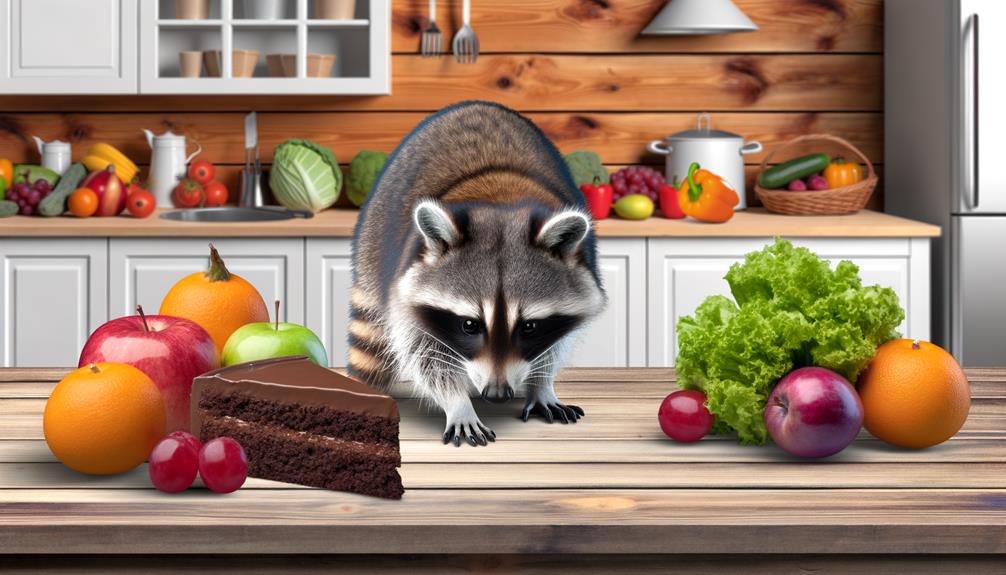
The consumption of chocolate cake poses important health risks to raccoons due to the presence of toxic ingredients such as theobromine, which can lead to poisoning.
Additionally, the high sugar and fat content in cake can contribute to obesity and diabetes, conditions that severely impact the overall health and longevity of raccoons.
It is essential to understand these health risks when considering the dietary habits of raccoons.
Toxic Ingredients Explained
Chocolate cake contains several ingredients that are frequently toxic to raccoons, posing significant health risks. Key components include:
- Theobromine: Found in chocolate, this compound can cause vomiting, diarrhea, seizures, and even death in raccoons.
- Caffeine: Also present in chocolate, caffeine exacerbates the harmful effects of theobromine and can lead to hyperactivity and arrhythmias.
- Sugar: High sugar content can lead to dental issues and metabolic disturbances.
- Xylitol: A common sugar substitute, xylitol is highly toxic to raccoons, causing rapid insulin release, hypoglycemia, and liver failure.
These ingredients can severely impact raccoon health, necessitating immediate veterinary attention if ingested. Therefore, chocolate cake should be strictly off-limits for raccoons to prevent fatal outcomes.
Obesity and Diabetes Risks
In addition to the harmful ingredients, the high calorie content and excess sugar levels in chocolate cake can greatly contribute to the development of obesity and diabetes in raccoons. Raccoons have a natural diet that is relatively low in refined sugars and simple carbohydrates. The introduction of such calorie-dense foods can disrupt their metabolic balance, leading to excessive weight gain and impaired glucose tolerance.
Prolonged exposure to high sugar levels can induce hyperglycemia, increasing the risk of diabetes. Additionally, obesity in raccoons can result in secondary health issues, including cardiovascular disease, joint problems, and a decreased lifespan.
As a result, it is essential to avoid feeding chocolate cake or similar high-calorie human foods to raccoons to maintain their health and well-being.
Nutritional Deficiencies
Raccoons consuming chocolate cake may face significant nutritional deficiencies due to the lack of essential vitamins and minerals in such a diet. The dietary composition of chocolate cake is mainly high in sugars and fats, which are insufficient to meet the nutritional needs of raccoons.
Key deficiencies may include:
- Vitamin A: Essential for vision and immune function, inadequately supplied by chocolate cake.
- Calcium: Essential for bone health and metabolic functions, often missing in sugary diets.
- Protein: Essential for muscle development and repair, inadequate in cake-based diets.
- Fibers: Important for digestive health, largely absent in processed foods.
These deficiencies can lead to long-term health complications, highlighting the unsuitability of chocolate cake as a dietary staple for raccoons.
Behavioral Impacts
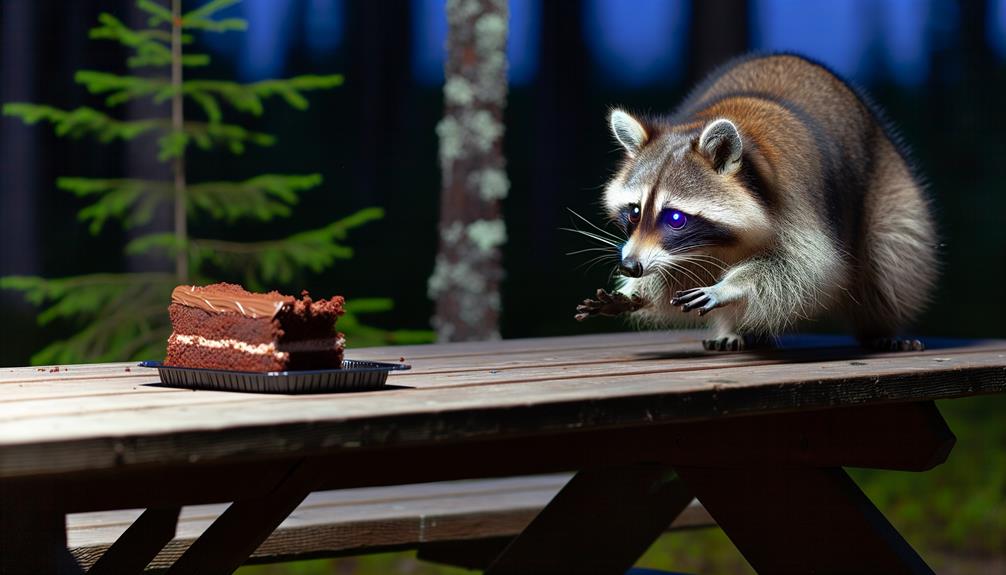
The consumption of chocolate cake by raccoons not only leads to nutritional deficiencies but may also result in significant behavioral changes. Elevated sugar and caffeine levels can induce hyperactivity, erratic movements, and increased aggression. Such behavioral alterations can disrupt their natural foraging patterns and social interactions within raccoon communities.
Additionally, theobromine—a toxic compound in chocolate—can cause neurological disturbances, resulting in disorientation and impaired motor function. Long-term exposure to these substances may lead to chronic stress and habituation to human food sources, further exacerbating risks associated with urban environments.
Hence, understanding the behavioral impacts of chocolate cake consumption is vital for wildlife management and conservation efforts to safeguard the well-being of raccoon populations.
Safe Treat Alternatives
Considering the adverse effects of chocolate cake consumption, it is crucial to explore safe and nutritionally balanced treat alternatives for raccoons.
Raccoons require a diet rich in protein, fats, and carbohydrates, with a preference for natural foods. Safe treat options include:
- Fruits: Apples, grapes, and berries offer essential vitamins and antioxidants.
- Vegetables: Carrots, sweet potatoes, and leafy greens provide necessary fiber and nutrients.
- Nuts: Unsalted peanuts, almonds, and walnuts supply healthy fats and proteins.
- Eggs: Hard-boiled eggs deliver a high-quality protein source.
These alternatives guarantee raccoons receive beneficial nutrients without the health risks associated with chocolate cake. Adopting these options supports the animals' well-being and aligns with responsible wildlife care practices.
Responsible Wildlife Feeding
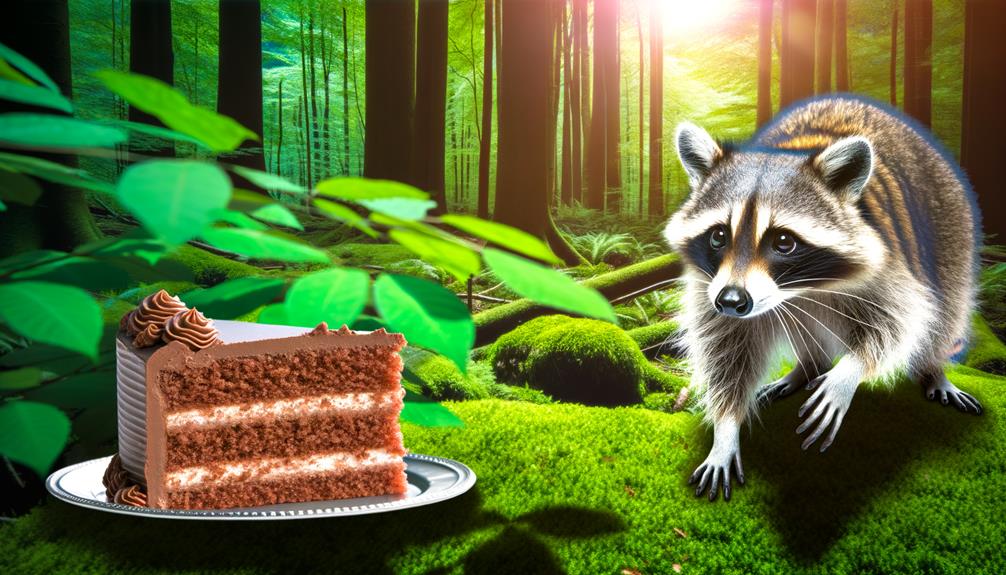
Ensuring responsible wildlife feeding practices involves understanding the specific dietary needs and natural behaviors of the animals in question. Raccoons, for instance, are omnivores with a diet that includes fruits, nuts, insects, and small animals.
Feeding them human foods, especially those high in sugar or chocolate, can disrupt their natural foraging behavior and lead to health issues such as obesity, diabetes, and even toxicity. It is essential to avoid creating dependency on human-provided food, which can diminish their survival skills.
Additionally, improper feeding can attract raccoons to human habitats, increasing the risk of conflict and disease transmission. Thus, responsible wildlife feeding should prioritize the well-being of the animals and the ecological balance of their natural environments.
Conclusion
While raccoons show dietary adaptability, consuming chocolate cake poses considerable health risks due to theobromine toxicity, a compound found in chocolate.
Notably, studies indicate that even small amounts of theobromine, as little as 20 mg/kg, can be harmful to raccoons. The ingestion of such substances can lead to severe neurological and physiological effects, including seizures and potential fatality.
Hence, to safeguard the well-being of urban wildlife, it is vital to offer safe, nutritionally appropriate food alternatives and discourage the provision of harmful human foods.


